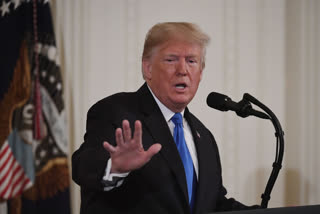Washington: US President Donald Trump has abandoned his bid to have a question about citizenship added to the 2020 Census, instead deciding to obtain the information via other means.
"The Department of Commerce sensibly decided to include a citizenship question on the 2020 Census as has been done many, many times throughout the history of the US," Trump said during an event in the Rose Garden of the White House on Thursday.
"Unfortunately this effort was delayed by meritless litigation," he said, referring to lawsuits that led to a Supreme Court ruling requiring the administration to provide a better rationale for adding the query, which last appeared on the census in 1950, Efe news reported.
Because delays caused by the need to resolve the legal issues "would have prevented us from completing the census on time", the President said, "we are pursuing a new option to ensure a complete and timely count of the non-citizen population".
He then signed an executive order requiring "every department and agency in the federal government to provide the Department of Commerce (which includes the Census Bureau) with all requested records regarding the number of citizens and non-citizens in our country".
Also Read: Dozens injured as Air Canada plane encounters turbulence
"We will utilise these vast federal databases to gain a full, complete, and accurate count of the non-citizen population," Trump said.
As recently as of July 5, the President said he was considering an executive order to compel the inclusion of the citizenship question on the 2020 Census - a move that would have led to even more litigation.
On July 2, the Department of Justice (DoJ) said that the 2020 Census would be printed without the citizenship question.
The administration's decision came five days after the Supreme Court said in 5-4 ruling that the government had to provide a better justification for adding the question to the census.
The US Constitution mandates that the population be counted every 10 years. The resulting figures are used to determine the number of seats a state has in the US House of Representatives, as well as distribution of roughly $800 billion in federal funds.
When the Commerce Department announced plans to add the citizenship questions, opponents responded by filing legal challenges.
While the Trump administration said the citizenship question was necessary to ensure compliance with the Voting Rights Act, critics contend the true aim is to intimidate non-citizen immigrants and hold down the count among groups that tend to vote Democratic.
